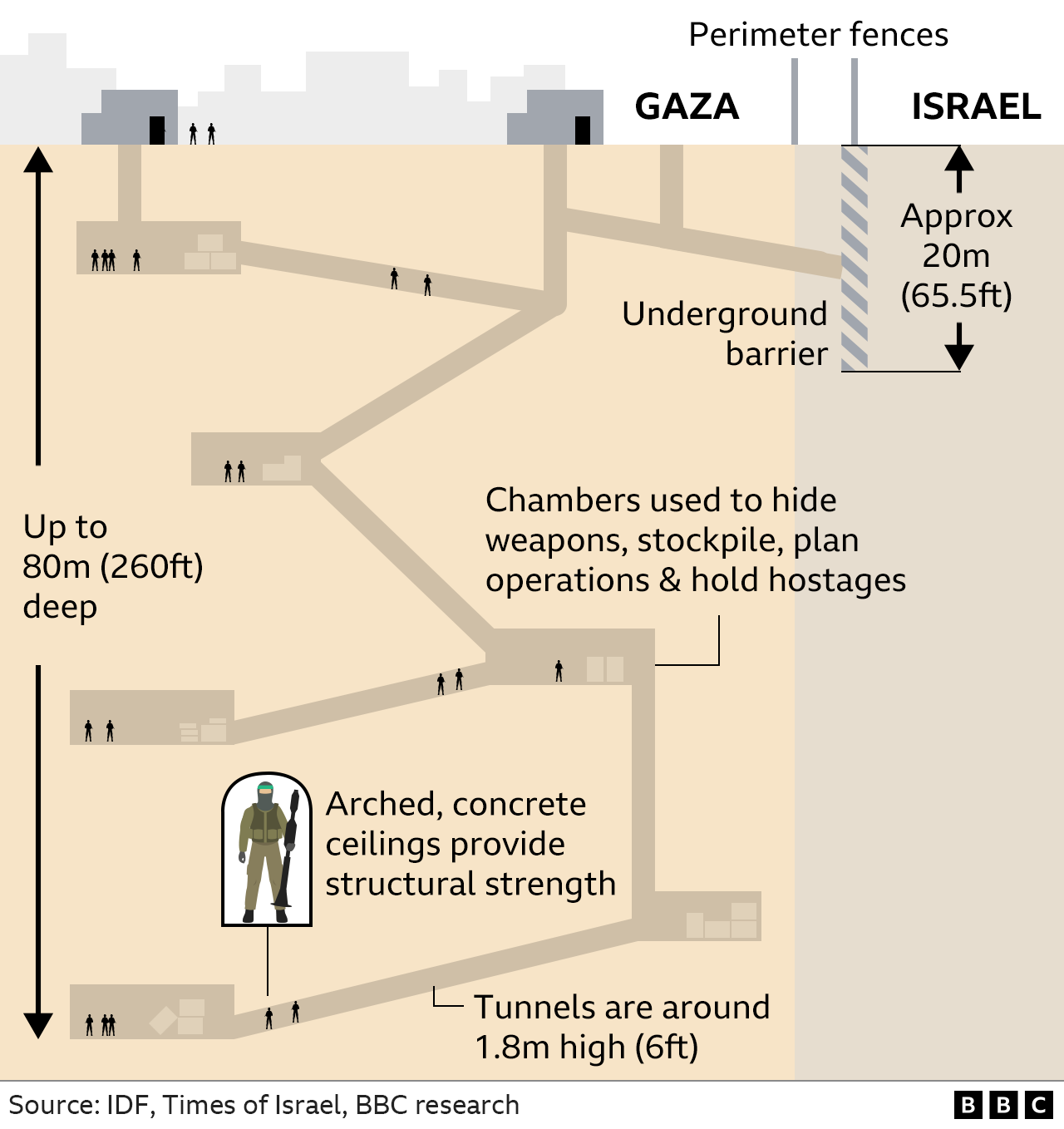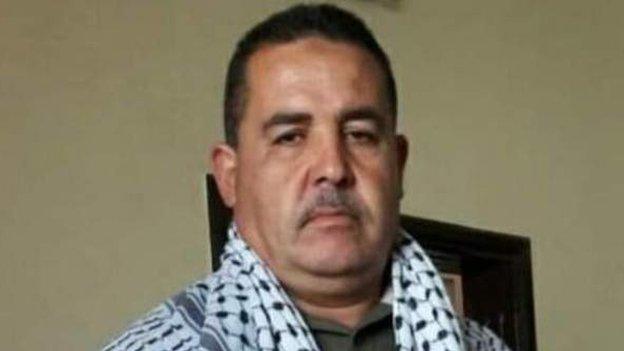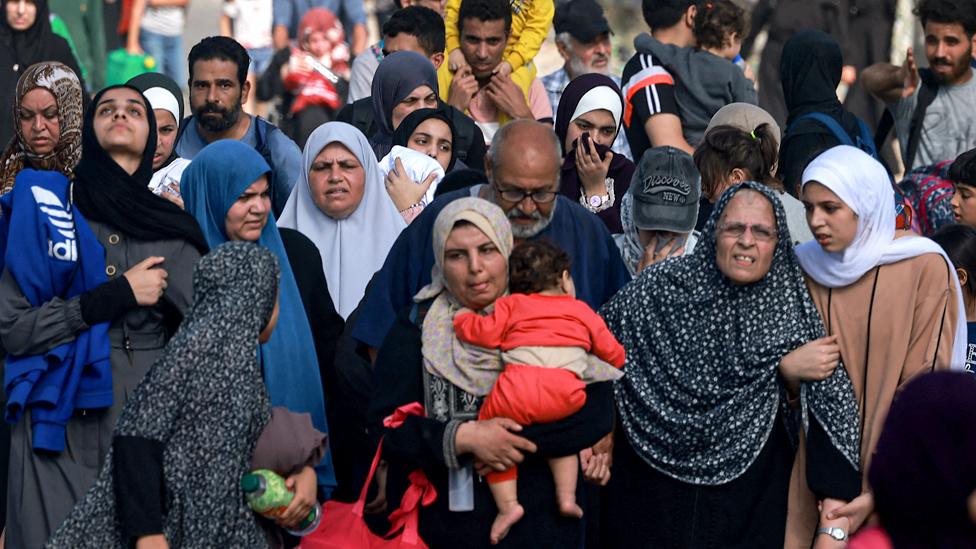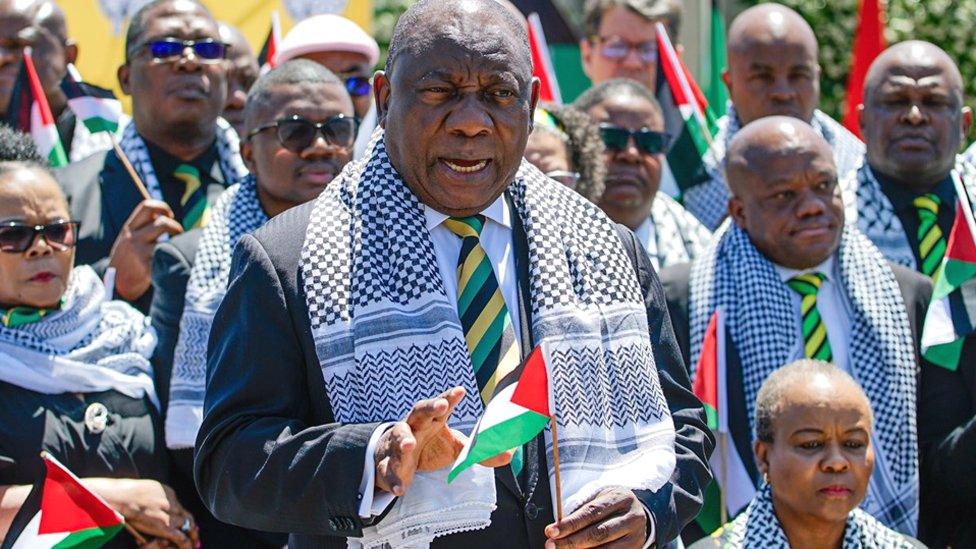Israel says troops operating 'in the heart of Gaza City'
- Published
Watch: Civilians leave northern Gaza on foot
Israeli troops are operating "in the heart of Gaza City", Defence Minister Yoav Gallant says, as the country's military operation to destroy Hamas continues.
He said troops on foot were being supported by armoured vehicles, tanks and military engineers.
For its part Hamas said it was inflicting losses on Israeli forces and had destroyed military vehicles.
The BBC cannot verify battle claims made by either side.
Mr Gallant said troops were destroying Hamas infrastructure and Yahya Sinwar - the commander Israel says planned the group's devastating 7 October attack, killing 1,400 people - was isolated in his bunker.
Israel's ground operation has been accompanied by devastating air strikes, which have killed more than 10,000 people, including thousands of children, according to the Hamas-run health agency in Gaza.
On Tuesday air strikes killed at least 23 people in the southern towns of Rafah and Khan Younis, Hamas-run health ministry officials said. Israel has told Gazans to go to southern Gaza for their own safety.
World Health Organization spokesman Christian Lindmeier said the "level of death and suffering" in the conflict was "hard to fathom" and an average of 160 children in Gaza were being killed every day.
Israeli leaders are making increasingly bold claims about their operation in Gaza - but their forces are clearly now well established in some of the most built-up areas of the city.
The army has released video of Israeli armoured vehicles operating along the coast road well to the south of the city centre, underlining that Israel now has the entire area encircled.
But none of this means that Gaza City is on the verge of collapse.
It is seen as Hamas's biggest stronghold, full of tunnels and bunkers. Israel says some of these are under major hospitals, including the city's largest, al-Shifa.

The Israeli advance into Gaza City has also triggered a fresh exodus of civilians, heeding Israeli warnings to leave their homes and head south.
For several hours on Tuesday, hundreds of people were on the move. Some on carts pulled by donkeys. Most on foot.
"It was so scary," Ola al-Ghul told AFP news agency. "We held our hands up and we kept walking. There were so many of us, we were holding white flags."
Holding a walking stick, Hatem Abu Riash described how he had to walk past heavily-armed Israeli troops after fleeing Jabalia refugee camp, north of Gaza City.
"Next to the soldiers, next to the guns, next to the tanks, the aeroplane... it was really horrible," he said.
"We are not terrorists - we are civilians - we want to live in peace," he added.
But the BBC's Rushdi Abu Alouf, who is in the southern town of Khan Younis, says half a million people are believed to be still living in northern Gaza.
One man in northern Gaza, Hamdi al-Hato, said he and his family could not leave because the road out was destroyed and he personally could not walk 5km because he had a weak heart.
"We are a family of nine people. I used to sell coffee and earn 20 shekels ($5; £4) a day. Today, I have no money left and we have no food, water, or anything. My children are starving," he told the BBC.
Most large bakeries in northern Gaza are closed due to lack of flour and fuel.

More on Israel-Gaza war
Follow live: Latest updates
From Israel: Pain still raw a month after Hamas attacks

Following the air strikes on southern Gaza footage showed one man emerging from the smouldering ruins of his home in Khan Younis.
"They show their might and power against civilians," he said. "Babies inside, kids inside."
A rescuer appeared to carry a dead baby out of the rubble, while a young girl waist-deep in rubble was slowly helped out.
A neighbour, Abu Jihad, watched the scene.
"People have been destroyed, their lives are destroyed," he said. "Thank God we are safe but I swear we are waiting for death each moment… it's a suspended death."
Later on Tuesday, Palestinian media reported that at least two residential buildings were destroyed in air strikes in the central town of Deir al-Balah.
The number of casualties was not clear, but footage showed people carrying at least four bodies from the remains of a house where two families had reportedly been staying. The official Wafa news agency cited witnesses as saying that dozens of people were killed or wounded in the strikes.
Meanwhile the Hamas military wing said it was continuing to fire rockets at Israeli cities and towns.
A BBC team in Tel Aviv reported loud explosions in the sky above the city as Israel's Iron Dome air defence system intercepted the rockets.
Related topics
- Published7 November 2023

- Published7 November 2023

- Published7 November 2023
